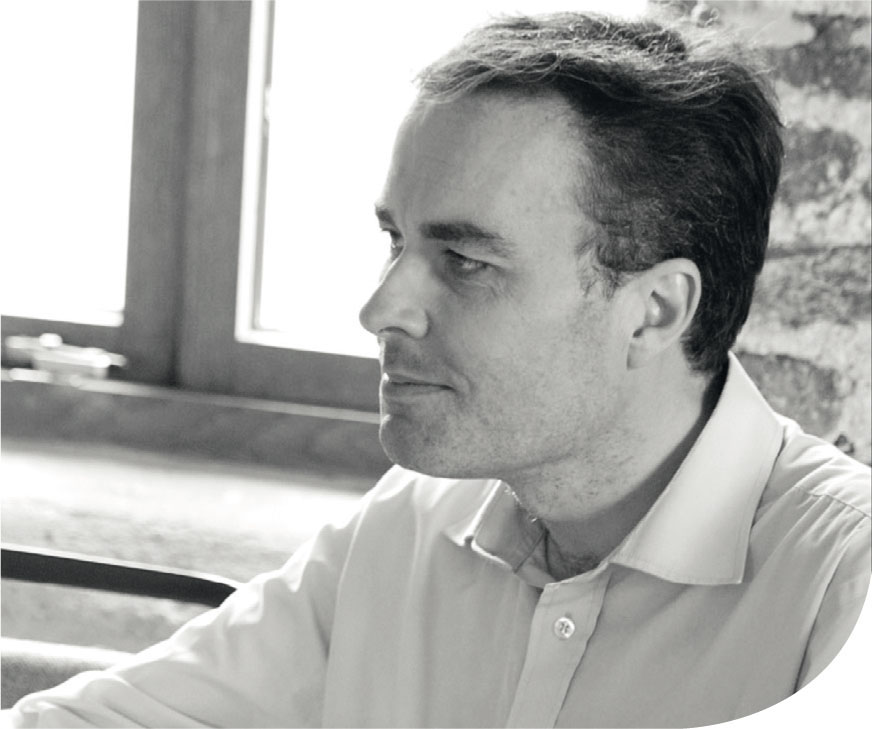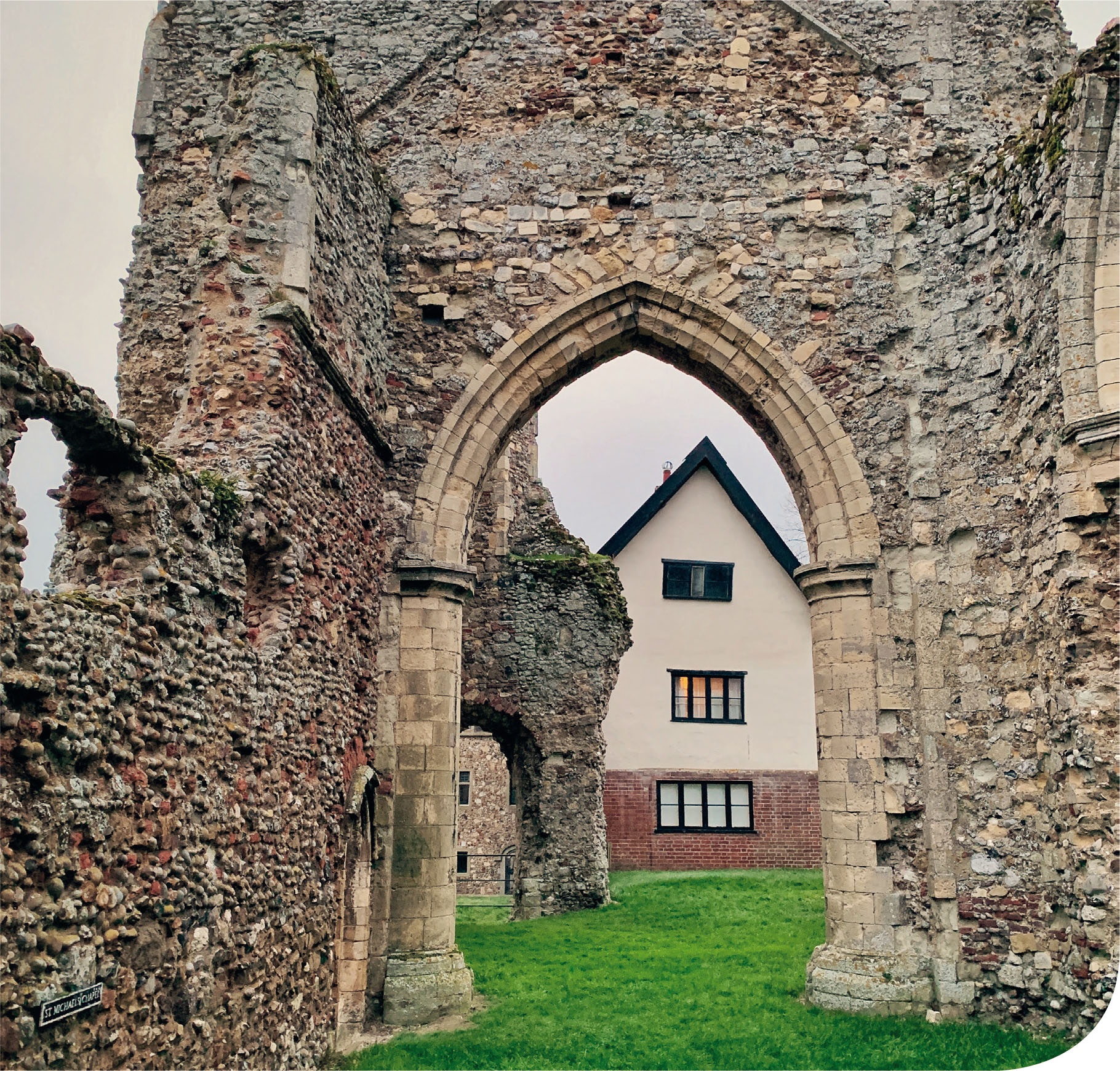
Andrew Quartermain adjusts the yellow teddy on top of the piano in his office. The eyepatch-wearing bear sits next to a bust of Beethoven. ‘These are two of Pro Corda's greatest influences,’ says Quartermain, only half-joking. Beethoven has had a long-term impact on Quartermain, pianist, CEO and artistic director of one of the UK's leading chamber music schools. The connection with Pudsey is more recent: over the last decade, Pro Corda has developed its programmes serving children with additional needs, and now has strong links with BBC Children in Need. It's one of several areas that Quartermain and his team have expanded as part of Pro Corda's modernisation in this, its 50th year.
Well, as modern as a charity that is based at a 14th-century abbey can be. While Pro Corda's business strategy is appropriately shiny, its site boasts the flint and brick remains of one of Suffolk's major monastic monuments. Leiston Abbey was a hub of activity in its day, featuring a huge refectory, store house and chapter house. The Premonstratensians, an order of white-habited canons, have since been replaced with a diverse range of music students who come from far and wide to immerse themselves in Pro Corda's classes, held in exquisite surroundings. The restored Abbey House is the main venue for the residential courses. Today, a melody from York Bowen's second viola sonata filters through the window. It's half term, and students are here to attend a special viola course led by Dr Louise Lansdown, head of the strings department at Royal Birmingham Conservatoire.
‘Chamber music will always lie at the heart of what we do,’ says Quartermain. ‘We follow our founders’ belief that chamber music can develop a person as well as a person's musicality.’ Those founders were violinist Pamela Spofforth and cellist Elizabeth Hewlins, who established Pro Corda in 1969. Back then, it was known as the National School for Young Chamber Music Players, and the first week-long course – with an intake of 25 students – took place at the Yehudi Menuhin School in Stoke D’Abernon. Other schools were used until 1977, when the trustees managed to raise sufficient funds to purchase Leiston Abbey House, where the institution has been based ever since.
Quartermain's connections with Pro Corda are personal. As a young violinist, he was invited by his duet partner to come along to one of the summer schools. Quartermain practically never left; after returning each year for various courses, upon graduating he took a job at the charity, becoming CEO in 2008. He describes Leiston Abbey as his ‘second home’. (And his first home, too; he lived on site for a period.)
But although the founding principles remain the same, Pro Corda's work has changed dramatically over the past five decades. ‘We're continually reviewing how best to use chamber music as a dynamic teaching tool,’ says Quartermain. ‘It continues to be a challenging time for charities; we're only as good as our last course – and last grant.’
Specialised tuition
The core chamber music courses are directed by Annabel Thwaite, who has worked with Pro Corda for 10 years. There are six courses a year, open to ages eight to 18, plus an introductory non-residential course. ‘The music is of great importance, but it's also about making friends with like-minded students,’ says Thwaite. ‘Because our maximum intake is 50, there is a high ratio of students to teachers. There are opportunities for the individual to shine.’
Aside from the core courses, the Pro Corda SEND course serves schools across the country. Then there's the Pro Corda Festival, held in January, February and March each year. The event is open to all instrumental ensembles of between three and nine players. Pro Corda provides coaching throughout the competition rounds, which take place at schools around the UK. Last year's instalment saw 176 entries from 35 schools. ‘Recently, there have been some incredible orchestral outreach projects, but we're keen to show how chamber music can be used to support shared learning, too,’ says Quartermain.
Pro Corda has also just launched a new programme called Creative Ensembles, which aims to support chamber music in schools nationwide. Unlike Pro Corda's core courses, which specialise in piano and strings, Creative Ensembles supports any instrumentation. ‘We provide the tools to introduce the building blocks of chamber music – whether there are existing chamber groups or not,’ says Quartermain. ‘This latest project will be year-round, thanks to a private donation. We're looking forward to working with hubs to deliver various resources.’
Live performance
A snippet of Bax's viola sonata can be heard from the rehearsal in the recital room outside Quartermain's office. The students on the viola course are preparing for tonight's concert, the conclusion of five days’ intense study. The concert is part of Pro Corda's fish and chip series, where audiences can enjoy a meal before the music. I join one of the small round tables and meet some of the regulars, most of whom are locals who are keen to support Pro Corda's endeavours. We feast (my bean patty, the non-fish option, is one of the best I've had) and swap musical stories. To my left are two serious amateur musicians – one, coincidentally, a viola player – on the other side are retirees who are new to the area and are enjoying learning more about chamber music through Pro Corda's informal concerts. We are a small audience, perhaps 30 or so; perfect for the repertoire. A variety of viola sonatas follow, including those by Bowen and Bax, and the standard is consistently high. ‘It's been wonderful to have the opportunity to be here, in these surroundings and have the chance to reflect on our playing – and our teaching,’ says Lansdown, a regular Pro Corda collaborator.

Andrew Quartermain, Pro Corda's CEO
While Pro Corda's spring and summer recitals benefit from seasonal footfall – passing cyclists are known to augment the fish and chip concert series – Quartermain is keen to point out that the Leiston Abbey site is not in direct competition with its neighbour, Snape Maltings. Creative campuses are a bit like buses: nothing for ages and then two superb examples appear from almost nowhere. ‘Snape Maltings is mainly box office with some education; we're education with some box office,’ says Quartermain. The two organisations work closely together on the Aldeburgh Young Musicians scheme and senior Pro Corda students are often taken to Aldeburgh Festival, as well as visits to Britten's Red House – and the beach.

(Image credit: Claire Jackson)
Opportunities for adults
There are select opportunities for adult amateurs – sometimes parents of children on other courses – to enjoy a residential course, too. The adult piano weekends – one of the few ‘non-chamber music’ options – combine piano studies with additional wellbeing development, such as yoga and Alexander Technique. The courses run in June and October and all levels are welcome, including absolute beginners.
Chamber music is sometimes thought of as an elite part of musical life; a skill that should only be honed once all the techniques are in place. But playing in small groups is so important to a rounded musical education. Thwaites tells the story of one particular child, who, when asked what the difference was between an orchestral course and a chamber music course said that in the former, she didn't think that anyone would have noticed if she wasn't there. That's not to belittle orchestral work, of course, which has its own distinct merits, but there is something special about music-making in small groups.
Having said that, can eight-year-olds really cope with the demands of a specialised residential course? ‘Absolutely,’ Thwaites reassures me. ‘We ask that students are around Grade 3 to 4. We do interview them, as of course they need to be a certain type of character to be able to be away from home, and we have wonderful pastoral staff. In a small chamber ensemble, players need to learn how to work together, sometimes following someone, sometimes leading. This is what happens in the playground and other school environments. Playing in a quartet or quintet brings a real sense of personal worth.’
The Pro Corda participants agree. Lots of parents who attended the courses as children are now returning with their own offspring. ‘There's one group of 17-year-olds who have been on courses together since they were small,’ says Thwaites. ‘They recently all went to the Guildhall together to research their future courses – I think that's extraordinary.’ With its beautiful setting and world-class teaching, it's easy to see why Pro Corda has built a loyal following – one that will no doubt stay with the charity for the next 50 years.








